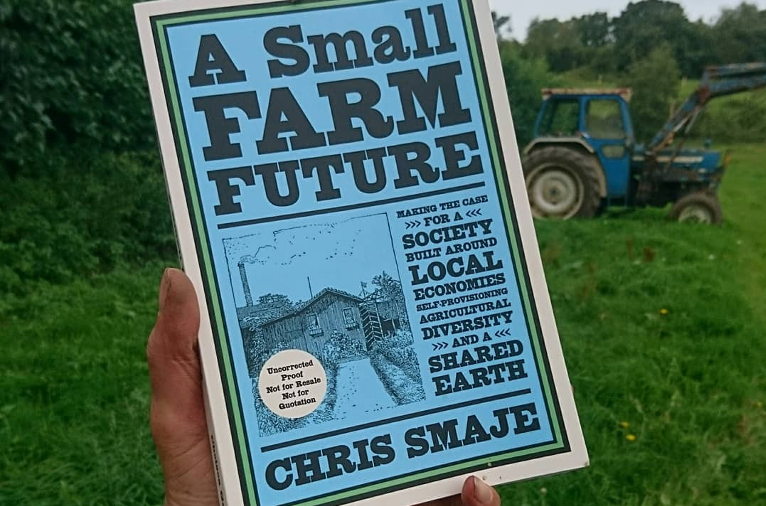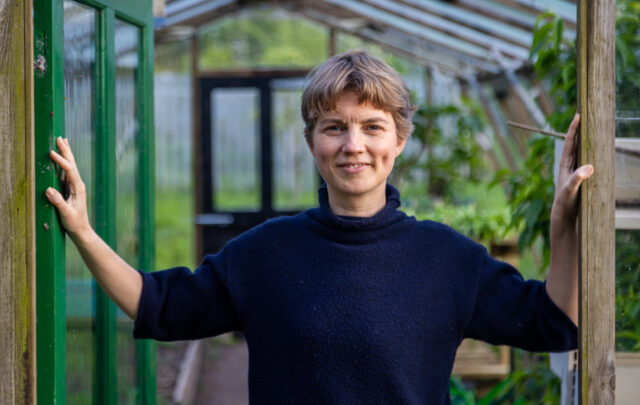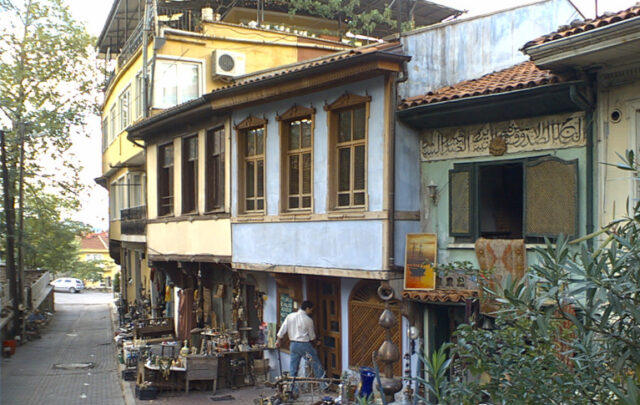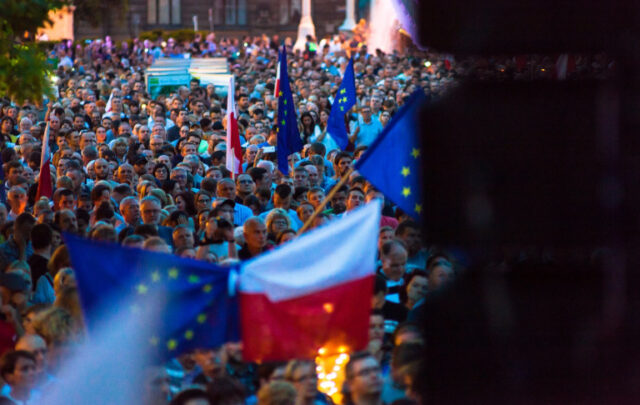I’ve been reading Max Ajl’s book A People’s Green New Deal. In this and possibly the next post I’ll be comparing a few of its themes with those from my own book A Small Farm Future, which I hope will lay some groundwork for discussions of small farm societies and small farm politics in the rest of this blog cycle1.
I’d warmly commend Max’s book as a thought-provoking, informed and informative contribution. Nevertheless, I think there’s something of a tension in it between a (neo-agrarian) populist perspective and an eco-socialist or Marxist one. I have a few sympathies with the latter, but ultimately I find the former a more plausible and appealing political route into the future. I’m not going to try to review or summarize Max’s book here, so much as try to explore some populist themes with his book (and mine) at my side.
Many political doctrines invest themselves in the notion that there are some kinds of people who are more ‘real’ than others, that they are the privileged possessors of a more authentic political agency, and it’s this dangerous idea (dangerous particularly when it’s associated with arguments about assuming control of the centralized state) that I’ll particularly be exploring in this (I’m afraid rather lengthy) post. Towards the end of it, I’ll explain what I mean by neo-agrarian populism a little more, and why I find it more appealing. But first I’m going to consider some other political traditions and their investments in notions of authentic peoplehood.
Before I do that, I should note that I’m not the only person to pick up on the blending of socialist/Marxist and populist themes in Max’s book. In an interview in ROAR Magazine, Kai Heron asked Max about this very point. Heron, some readers of this blog might recall, co-authored a review of my own book that homed in on its populist elements for a ferocious critique.
In my opinion, the review was none too fastidious about accurate characterization of my arguments, ill-informed about basic concepts such as ‘feudalism’ and seemingly actuated by a doctrinaire old-school Marxism with which I’m out of sympathy. My brief interactions with Heron didn’t suggest much possibility of constructive engagement, so I decided not to debate with him – a decision that remains firm.
But this hasn’t left me entirely satisfied, and I found it hard to read Max’s book without puzzling over the various alignments and non-alignments between me, Max and Heron concerning populism and socialism – for example in the call for a mix of family and cooperative farming that Max’s book shares with mine. So in posts to come I’ll address this via issues I raised in my book like gender, kinship and property rights that Max also touches on in his own volume and that particularly prompted Heron and his co-author Alex Heffron’s fusillades towards me. Whether I’ll respond directly to Heffron and Heron’s criticisms now I’ve reached the relevant part of this blog cycle, I’m not yet sure. Let me know if you think that might be interesting.
For now, though, I’ll stick to my theme of ‘real personhood’ and broach it in relation to a wholly different front in the political war of words.
Real People #1 and #2: the cultural nationalist and the countryperson
Over the years, my writings have gained some engagement from a small subset of people who, like me, are supportive of small farm localism and opposed to capitalist globalization, but from a vantage point quite far to the political right. Usually, our engagements haven’t ended well, and usually the point of no return has been around the issue of migration, on which the right stakes one of its major claims about authentic personhood.
The argument typically goes that large-scale migration is a bad thing, especially large-scale migration prompted by climate change and other crises at a time when we need to ‘look after our own’. How we define ‘our own’ – those real people of whom here I speak – is more often assumed than demonstrated, but usually relies on some form of cultural nationalism grounded in an existing structure of the nation-state supposedly threatened by the incomers.
I’m not going to expend many words on this. National culture is scarcely the fixed thing of the right-wing imagination (see A Small Farm Future, Chapter 18). The threat to culture is an artefact of a view of culture inclined to feel threatened. But even if one accepts these cultural nationalist premises (which I don’t), I doubt juridical and military attempts to prevent large-scale migration will ultimately be successful, and they will redound negatively upon political and cultural life in the places doing the defending. Moreover, the defending is probably unnecessary on livelihood grounds (A Small Farm Future, Chapter 11). And it’s unethical. You have to be a pretty hardened cultural nationalist to turn your back on destitute and endangered refugees from other countries (looking at you, Nigel Farage), especially when the actions and inactions of your own country have played a large part in their destitution.
There is, however, a narrative of migration as cultural threat that’s popular on the left as well as the right – gentrification. In rural and agrarian contexts this can be ecologically flavoured too – how can we possibly retain ‘our own’ sustainable rural culture fitted to local circumstances if it’s perturbed by an endless stream of incomers? Gentrification narratives are heavy with ideologies of ‘real’ personhood: the ‘real people’ of this neighbourhood, town, region etc. as determined by culture, class and/or natality.
I hope to write more elsewhere about rural gentrification. For now, I’ll just say that I’m inclined to see gentrification of all kinds more as an issue of affordable local land or housing – an issue of economic justice – rather than a cultural one. Culturally, in much of the Global North – and indeed in much of the Global South too – the notion that there’s a sui generis sustainable rural culture threatened by the intrusion of incomers from elsewhere usually carries little more weight than parallel right-wing fears of a threatened national culture.
A ruralisation of the global population in the coming years seems to me inevitable, but while I don’t see large-scale migration as intrinsically bad, I don’t think it’s intrinsically good either. As Jahi Chappell said on this site a while back, it would be good if people could exercise a right not to have to migrate. This would involve breaking out of the centre-periphery structuring of the global economy with its highly uneven allocation of wealth and wellbeing that inevitably draws migrants from periphery to centre. I discuss this in Part I of my book, and Max also discusses it extensively in his one, making the case for climate change reparation payments from the Global North to the Global South. I find his case for it within present global economic structures indisputable.
Real people #3: indigeneity
Another much favoured category of real personhood nowadays is indigenous peoples, whose cosmologies and ecological practices are often seen as inspirational for renewable, post-capitalist human ecologies. I too find inspiration in this and briefly discussed it in my book, while Max plumbs the issue more thoroughly in his, most particularly in relation to people in settler-colonial societies who trace their ancestry to a pre-colonial population.
There is, however, a danger of invoking indigeneity generically as something that particular individuals have because of their ancestry and that elevates them above the non-indigenous. Indigeneity as authenticity. This is a simple inversion of modernist-colonial ideology, which typically emphasizes the inferiority of the indigenous culture compared to the modernity of the incomers, while indigenism recuperates the superiority of the indigenous compared to the inauthenticity of the modern.
I think Max courts this danger in his book, and his defences against it aren’t wholly convincing. But at its best his discussion of indigeneity emphasizes the importance of self-determination for indigenous people as modern people with a right “to decide how and with whom they want to live” (p.149) in contexts where that right was historically extinguished by centralized settler-colonial states operating on quite different political principles to their own. Such claims are not made upon the modern state but independently of it, albeit with a necessary recognition of its ongoing reach.
I’m in complete agreement with this. In my own book, I articulate it more generally as a future reality that many people will face worldwide, not just those who are heirs to an obvious indigenous ancestry outside the cultural reckoning of the contemporary state. It’s what I call ‘the supersedure state’, and I’ll come to it later in the blog cycle.
But one of the problems with the idea of a people’s self-determination is that it leaves unsaid exactly how you constitute ‘a people’ and who is the ‘self’ that’s getting determined. There are power relationships, alternative narratives and micropolitics within every would-be ‘people’, perhaps the more so when it inevitably has to organize itself with respect to the power of the modern nation-state. Accepting ‘a’ people’s right to self-determination is a basic prerequisite for transcending the existing power structure, but it doesn’t get you very far in addressing the political questions and conflicts faced by this new political ‘self’. Particularly if it involves resource claims against existing states based on personal identity as ‘indigenous’ or some such claim to meta-state authenticity, there’s much potential for manufacturing conflicted and novel performative identities around such notions of ‘indigeneity’ – as in analyses of ‘the hyperreal Indian’ or ‘the obligatory Indian’2.
As I see it, those novel performative identities are as ‘real’ as any other political identity, but it would be easier to clarify the messy political choices people face in modern societies if analysts stopped implicitly seeing certain people or political identities as more real than others. I encountered this in engaging with Peter Gelderloos’s view that the Standing Rock pipeline protests in the USA were somehow more authentic than the Extinction Rebellion (XR) protests originating in the UK along the lines that Standing Rock was a real defence of homeland, conducted by real people authentically grounded in a proper political identity. Max pretty much recapitulates this problematic dualism in his book. I think more plural and conflicted political imaginaries are necessary.
Max’s call for “tremendous investments in high-speed rail” (p.111) also interests me in relation to these questions of indigeneity and authenticity, at both global and local levels. Thinking globally, high-speed rail systems represent an enormous accumulation and concentration of capital that I think are colonial in origin and unachievable by any ‘indigenous’ culture oriented to living renewably from local resources. They also represent an enormous privileging of some people’s and some places’ connectivity at the expense of others.
Thinking more locally, here in England the costs of the government’s flagship new high speed rail project (HS2) have inflated threefold from initial estimates to around £100 billion, while the despoilation of the countryside caused by its construction along with associated quarrying and water drawdown has prompted extensive protests involving wealthy homeowners living alongside HS2’s various sites of extraction and construction, other local residents horrified at the destruction of much loved woodlands and natural habitats (defending their homelands?), eco-activists, left-wing critics of government spending priorities and small state libertarians, while XR has helped create a new ecology of protest linking these various causes. I don’t think older languages of indigeneity or of economic class interest are really alive to these shifting contemporary terrains.
Whether such populist allegiances will prove politically transformative remains to be seen, though the bar for success has been set pretty low by more traditional forms of leftwing and labour organization in contemporary England. I argue in A Small Farm Future that the real test will come with the declining ability of centralized nation-states to provide prosperity, wellbeing and geopolitical structure – in which circumstance, I think any local successes will mostly be plural and populist, rather than indigenous and/or traditionally class-structured.
A whole other side of ‘indigeneity’ is indigenous practices of livelihood-making. In this view, prior to the nexus of colonization, globalization, fossil energy use and capitalist development, indigenous people figured out renewable ways of living from local land and resources that can inspire a more sustainable future. It’s a view I share, particularly if we take a capacious view of ‘indigeneity’. People developed low-impact and low-energy forms of livelihood making everywhere in the world, and the local premodern ‘indigenous’ form should probably be the first place we look for inspiration today – perhaps, as I wrote in A Small Farm Future (p.152), in some places with an overdue dose of postcolonial humility concerning the livelihood skills of indigenous peoples through deep human time.
But some nuance is needed. Biogeographies and population distributions have changed. New crops and knowledges have emerged, while old ones have decayed (I find it hard to imagine, for example, plausible future livelihood-making in the UK without a greater dependence on the potato than in premodern times, or in the Pacific Northwest of North America without a lesser dependence on the salmon). Some people identifying as indigenous have learned ancestral skills of local livelihood-making. So have some people not identifying as indigenous, while there are indigenous people living urban lives who lack knowledge of those lifeways.
The point I’m driving towards is that indigeneity as political identity-making and indigeneity as economic livelihood-making both involve complex, potentially conflicted and changing practices. Fundamentally, indigeneity is more something that people do or create, make or remake, drawing on various pre-existing resources, than something that certain people simply and authentically ‘are’ or ‘have’. So I find it curious that Heron criticizes my book for having “no discussion whatsoever about race and indigeneity”, partly because it’s not actually true, partly because I don’t think one should invoke a generic ‘indigeneity’ without seriously questioning the term, and partly because my book is concerned with little other than indigeneity in the sense of how people worldwide – relatively few of whom, after the tremendous dislocations of modernity, have a good claim to being a ‘real’ local indigene – can learn to create their own sense of indigeneity in a future that Max aptly diagnoses will be one of “world-wandering refugees” (p.41). In such a world, claims to being a real person, an authentic indigene, will usually be at best irrelevant and at worst a status strategy pregnant with the potential for violence.
I don’t think the position I’m charting here is incompatible with the idea that people who identify as indigenous within contemporary settler-colonial states have a legitimate claim to self-determination which shines a spotlight on historical injustice. Nor, however, does this seem to me the most decisive challenge of present times. That challenge lies rather in how those of us who are not ‘real’ indigenous people might aspire to the label.
Real people #4: the proletariat
Now onto a final kind of political authenticity – the vaunting by parts of the left of the landless, waged, working-class (the ‘proletariat’) as the real agents of history. A key ancestor here is Karl Marx, with his insistence that the most exploited people in the most ‘advanced’ capitalist societies of his day, the industrial proletariat, would redeem capitalist society through socialism. This was a much more plausible claim to make when Marx was formulating it around 150 years ago than it is today, but towards the end of his life even Marx began recanting this position and entertaining the possibility of a peasant road to socialism – a smart move, since it turned out that all the major successful communist revolutions of the 20th century were predominantly peasant ones3.
Unfortunately this insight of the older Marx barely percolated into the later Marxist tradition, not least because of the efforts of Vladimir Lenin, father of Soviet communism. In The Development of Capitalism in Russia and other writings, Lenin made three interlinked arguments:
- The Russian peasantry was dividing essentially into an upper stratum of would-be capitalist farmers and a lower stratum of increasingly landless rural labourers, thus replicating Marx’s favoured scheme of a dualistic clash between capitalist and proletarian.
- The peasantry was incapable in itself of creating a transformational communist society. For this, it required the assistance of the proletariat and revolutionary cadres to take charge of the state.
- Forms of left-wing politics that deviated from these and other orthodoxies of Marxism-Leninism were ultimately incorrect, insufficiently transformative, complicit with capitalism and in need of cancellation.
These arguments have had a long afterlife as central tenets of orthodox Marxism, but none of them are terribly convincing. I see the second and third as basically hubristic self-promotion of Leninist doctrine. As to the first, it’s true that in circumstances of novel capitalist penetration and development (so, unlike the circumstances facing people across much of the world in the years to come…) there can be processes of economic differentiation among peasantries. But not just among peasantries. There’s no particular historical justification for Marx’s and then Lenin’s demotion of peasantries as transformational political actors, nor for the vaunting of wage labourers in this ‘real person’ role, supposedly immune to differentiations of their own. Göran Djurfeldt wrote “The postulation of law-like tendencies in the capitalist mode of production in Lenin tends to regress to a Hegelian postulation of essences”, concluding “those who take over the predictions of the classics and attempt to apply them wholesale to contemporary agriculture are engaged in a futile and dogmatic exercise”4.
That conclusion seems all the sounder in 2021 than when it was written forty years ago. Heffron and Heron invoke Lenin’s Development of Capitalism in Russia (published 1899) as if to disprove my argument that small-scale owner-occupier farming might form part of a worthwhile and stable future response to present problems, but to my mind their ahistorical postulation of essentialist categories – ‘‘upper’, ‘middle’ and ‘lower’ peasantries, progressive collective subjects and so forth – speaks more to their own rather fossilized search for authenticity than to any particular defect of my analysis. Perhaps I only have myself to blame for trafficking at all with the language of peasantries and 19th century debates about peasant transitions. Increasingly I’m inclined to think these have virtually no relevance to the agrarian transitions of the future. Again though, if anyone would like me to elaborate on that, do please let me know.
Populism
Notwithstanding Lenin, it’s undoubtedly true that humans of all kinds are extraordinarily gifted at splitting themselves up into disparate and antagonistic groups (Marxists are particularly adept at this – the differentiation of the peasantry is as nothing compared to the differentiation of the Marxists). If we let go of the notion that there’s some category of ‘real’ people with the singular capacity to stitch together a unified and authentic social order – and I think we do need to let go of it – then we’re left with the conclusion that any concept of society or of ‘a people’ is mere contrivance, an artificial construct.
In A Small Farm Future, I embrace that conclusion. Indeed, I argue that probably the only way we’re going to get through the years to come without horrific bloodshed is to effect forms of neo-agrarian populism that elaborate it. ‘Neo-agrarian’ because only a turn to low ecological impact, low-energy, job-rich agriculture serving primarily local needs can adequately address current biophysical and socioeconomic crises – the ‘neo’ referencing the point that, while in many ways these agrarianisms will be inspired by historic or ‘indigenous’ low-impact and low-energy agricultures, they will also have new elements fitted to new times and are not about restoring some notion of a better past.
‘Populism’ because it will be necessary to constitute peoples or ‘a people’ who are in some way unified around neo-agrarian practices out of the disparate constituencies and identities in the contemporary world. There are bad populisms that try to make only some kinds of people representative of the body politic, as in a good deal of the Brexit-mongering we’ve endured here in the UK in recent years. More sophisticated populisms recognize the contrivance involved in constituting ‘a people’, where nobody is any more ‘real’ than anyone else.
The downside of neo-agrarian populism is that hardly anyone in the world today is practicing neo-agrarianism, which makes implementing it an enormously tall order – an object without a subject. The upside is that this absence neatly sidesteps all the debates about who the ‘real’ people are, the authentic agents of history. Nobody is real. Or everybody is. What’s real is how we have to make a material livelihood, and in this people are a lot more constrained by the ecological feedback of the world around them than most currents of modern political thought seem to believe.
There are many openings toward neo-agrarian populism of this kind in Max’s book, but also various points where I think he shies away from the difficulties and compromises involved in trying to constitute ‘a people’ in favour of a more mechanical politics that too easily delivers it via ‘real person’ agency.
These tensions lurk, for example, within Max’s statement that “Marxism where it has been most successful has been able to adopt and rework populist and nationalist vernaculars and demands in the service of revolutionary transformations in the world”, referencing “Lenin’s adoption of some of the rhetoric of Russian populism”. This is all true enough. But Lenin was engaged in a fierce and high-stakes argument against the Russian agrarian populists, just as the agents of liberal capitalism in the US and elsewhere were battling their own local agrarian populisms around the same time.
Lenin and these other avatars of a supposedly progressive industrial modernity won their political battles, as protagonists for the centralization of political power and authority often do, but I don’t think they won the intellectual arguments, and their narrow visions of industrialized progress delivered by strictly delimited classes of ‘real’ people in alliance with centralized and more or less authoritarian states haunt the problems of the 21st century. I think part of the answer to those problems is going to have to be neo-agrarian populisms less dazzled by the idea of material progress, and less fussy about precisely which people it considers to be the true agents of history.
So I agree with Max where he endorses “autonomous thinking about the common life, or communism” (p.54) while believing that such thinking will have to claim a more capacious notion of the common life or communism back from a good deal of Marxist (and, more so, Leninist) thought. Elsewhere Max writes that one has to ask whom one’s friends are and whom are one’s enemies (p.68). I’d hope that neo-agrarian populisms can be friends with various currents of left-wing, socialist and Marx-inspired thinking. Certainly, there’s much I feel friendly towards in Max’s book, and I find his overall framing of the issues facing humanity very largely plausible. On the other hand, I feel little friendship towards the ongoing disdain of certain other leftists for what they see as the miseries of small-scale agrarianism and their taste for authoritarian big-state collectivism. Quite how such alignments and non-alignments play out in future politics is going to have a huge impact on future generations’ experience of the world.
Notes
- Max Ajl. 2021. A People’s Green New Deal. Pluto Press; Chris Smaje. 2020. A Small Farm Future. Chelsea Green.
- Alcida Ramos. 1994. The hyperreal Indian. Critique of Anthropology. 14, 2; David Stoll. 2011. The obligatory Indian. Dialectical Anthropology35: 135-46.
- See: Eric Wolf. 1969. Peasant Wars of the Twentieth Century. Harper & Row;Teodor Shanin. 1983. Late Marx and the Russian Road. Monthly Review Press; Kristin Ross. 2015. Communal Luxury. Verso.
- Göran Djurfeldt. 1982. “Classical discussions of capital and peasantry: a critique,” in John Harriss (ed). Rural Development. Hutchinson.






